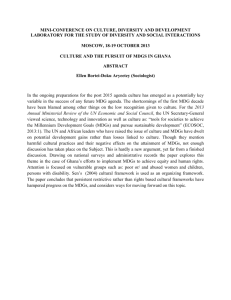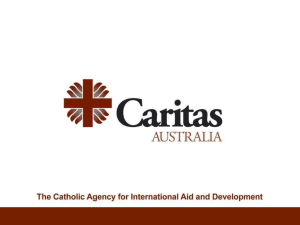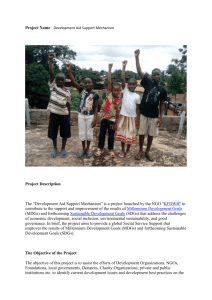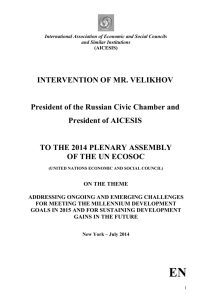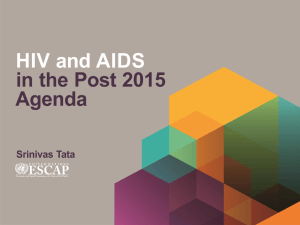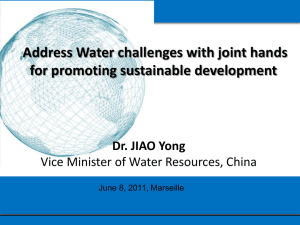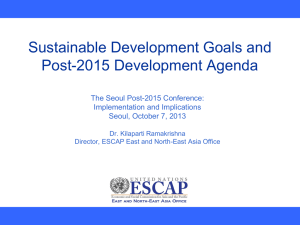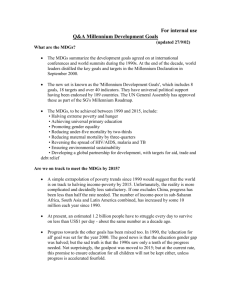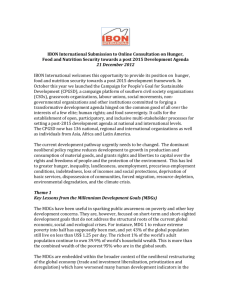and Opening Address - Parliament of South Africa
advertisement
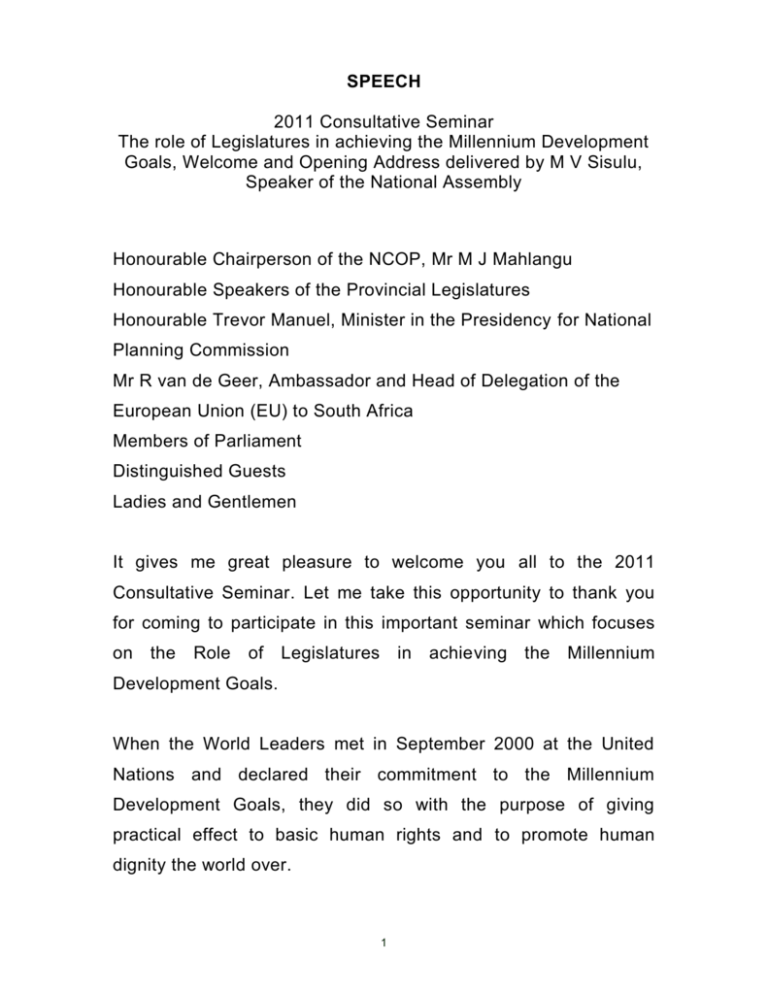
SPEECH 2011 Consultative Seminar The role of Legislatures in achieving the Millennium Development Goals, Welcome and Opening Address delivered by M V Sisulu, Speaker of the National Assembly Honourable Chairperson of the NCOP, Mr M J Mahlangu Honourable Speakers of the Provincial Legislatures Honourable Trevor Manuel, Minister in the Presidency for National Planning Commission Mr R van de Geer, Ambassador and Head of Delegation of the European Union (EU) to South Africa Members of Parliament Distinguished Guests Ladies and Gentlemen It gives me great pleasure to welcome you all to the 2011 Consultative Seminar. Let me take this opportunity to thank you for coming to participate in this important seminar which focuses on the Role of Legislatures in achieving the Millennium Development Goals. When the World Leaders met in September 2000 at the United Nations and declared their commitment to the Millennium Development Goals, they did so with the purpose of giving practical effect to basic human rights and to promote human dignity the world over. 1 The Millennium Development Goals, commonly known as MDGs, are eight global time-bound targets for reducing all manifestations of extreme poverty, including income poverty, hunger, disease, lack of adequate shelter and exclusion, by the year 2015, while promoting gender equality, basic education and environmental sustainability. The eight Millennium Development Goals are: Goal 1: Eradicate extreme poverty and hunger; Goal 2: Achieve universal primary education; Goal 3: Promote gender equality and empower women; Goal 4: Reduce child mortality; Goal 5: Improve maternal health; Goal 6: Combat HIV and AIDS, malaria and other diseases; Goal 7: Ensure environmental sustainability; and Goal 8: Develop a global partnership for development. The other speakers will elaborate on them and give details on how far we have progressed in meeting the deadline of the year 2015. The world leaders set the target date of the year 2015 on the understanding that MDGs will be achieved by all our combined efforts working together for the benefit of mankind. It is our collective responsibility and we should therefore work together to ensure that human development reaches all our people. 2 The Millennium Development Goals programme is a commitment for nations to move towards greater equity and for people, both individually and collectively, to achieve greater prosperity and fulfilment. The MDGs define tangible, measurable indicators that allow judgement on their achievement. The indicators contained in the Millennium Declaration define a set of goals and targets to which all countries must strive, either in terms of reaching these goals for their own populations or assisting poorer countries to achieve them. Honourable Chairperson, Honourable Speakers and Distinguished Guests We meet here today just four years before the year 2015. This gathering provides us with the opportunity as representatives of the national and provincial parliaments to take stock of how far South Africa has progressed in achieving the MDGs and more importantly what we need to do as Parliament and provincial legislatures to ensure and assist in accelerating the attainment of these important goals for the benefit of our people. The question that we need to ask ourselves at this gathering is whether we can confidently say that by the year 2015 national poverty levels will be cut by half, that of millions of lives will be saved and that more people will have the opportunity to benefit from the economy? 3 The answer to this question lies in what we can do as the legislatures to assist all of us to realise the MDGs. We recognise that the responsibility to implement and achieve the MDGs and their associated targets lie not only with government, but with all citizens and organisations in our country. Parliament and provincial legislatures have an important role to play in ensuring the implementation and realisation of the MDGs. As freely elected representatives of the people, Parliamentarians are the link between the electorate and the government and this unique position presents us as Parliamentarians with an opportunity to be change agents through our representational, oversight and legislative roles. We must therefore use our oversight role to focus our assessment on the following areas: 1. Whether and to what extent progress is being made towards achieving the MDGs; 2. Whether government policy is being effectively implemented; and 3. What impact these policies are having on achieving the targets outlined in the MDGs. One way in which engagement on the MDGs can be effected is through the acquisition and articulation of information obtained from the ground by MPs and MPLs in the course of their constituency work. 4 Honourable Chairperson, Honourable Speakers and Distinguished Guests During the 3rd World Conference of Speakers of Parliament held in Geneva last year to discuss, among others, the progress on MDGs, the Speakers agreed that parliaments must use their legislative and oversight powers to assist their governments in the attainment of the MDGs. The declaration adopted by the conference stated and I quote: “…The Millennium Development Goals will not be met without a strong sense of accountability accompanying all efforts. Democracy, security, development, human rights and gender equality are inextricably linked. Our parliaments can do more to ensure that development goals are taken into account in our daily work and translated into national programs and laws. Likewise, we encourage our parliaments, when they examine draft budgets and bills, to assess their impact on the fulfillment of the Goals. We pledge to support these efforts, monitor progress closely and do our part in meeting the targets by 2015”. In our Parliament we have opted to mainstream the MDGs in the work of committees rather than creating a committee dedicated to MDGs as is the case with other countries. This was to ensure that it is an ongoing part of the work of our parliamentary committees to review the progress and impact made by government departments in achieving the Millennium Development Goals. 5 It is for Parliament to ensure that commitments to the MDGs are truly reflected in national, provincial and local government plans, policies and in budgets. In addition each government department is required to indicate in its strategic plan which is submitted to Parliament annually how it had planned its activities with regard to the MDGs. The departments’ annual reports also have to reflect how this was achieved. Parliamentary committees are required when assessing the performance of the departments to assess their performance on the MDGs and to use the information in the evaluation of the budget Votes. Currently our Parliament is at the stage of evaluation of the budget Votes. Parliamentary committees must ensure that that the scarce resources of our government are spent on the needs of our people and more importantly on poverty alleviation strategies. Parliamentary committees must therefore ensure that in scrutinising the budgets, policies allow for sufficient public expenditures for all social programmes particularly basic social services. Our oversight function is the most important power that the legislatures have to ensure and assist government to meet the commitment to implement strategies aimed at accelerating attainment of the MDGs. The exercise of our oversight function must therefore not only be a fault-finding process on government but must also be focused on the proactive detection of problem areas. 6 Honourable Chairperson, Honourable Speakers and Distinguished Guests Parliament and legislatures as the platforms for public consideration of issues should provide opportunity and space to debate MDGs. Let us also mobilise the entire society to help propel the MDGs forward and encourage action on the ground through promoting the understanding that MDGs can only be achieved by all our combined efforts. This seminar provides us with an opportunity to reflect on our challenges and successes in achieving the MDGs and to chart our way forward to the 2015 countdown and beyond. It provides a useful yardstick by which to measure our progress and define our future actions. The MDGs must continue to provide a focus for our efforts, while the vision of a world without poverty must not be lost despite the current difficult times. Our efforts to bring the MDG targets for 2015 within reach of all must not cease. Let us therefore use this seminar to develop processes that will enhance our role as the legislature in this important task of eradicating poverty and ensuring that human development reaches all our people. Thank you. 7
